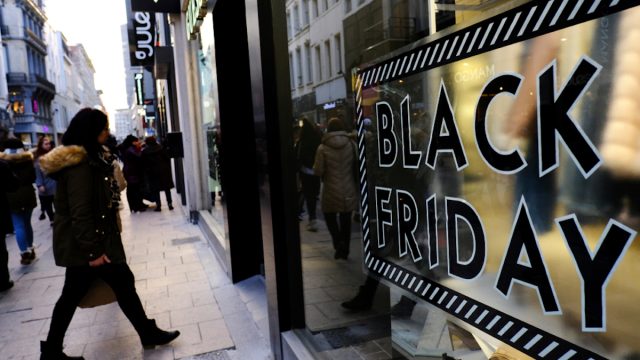The Dark History Behind the Name “Black Friday”

Whether you love it or dread it, you likely have strong feelings about Black Friday. Sure, the retail holiday on the day after Thanksgiving offers some of the best deals of the year, but only if you can look past the overcrowding and mayhem, of course. You may have wondered, if this holiday is supposed to be about scoring sweet savings, then why is its name so dark? Well, there are quite a few theories surrounding the origins of the name “Black Friday.” Read on to learn how the name came to be, and for more holiday history, find out The Real Reason Thanksgiving Is on the Fourth Thursday of November.
Read the original article on Best Life.
One theory is about how retailers recorded sales with the colors black and red.

As History notes, retail companies used to record losses in red and profits in black. The stores operating at a loss—or “in the red”—tended to go back “into the black” on the day after Thanksgiving, so some people believe that this is where the name “Black Friday” originates from. And for more backstories of words you use all the time, check out The Amazing Origins of Everyday Slang Terms You Use Constantly.
But the origin of the holiday’s moniker might also have to do with the gold market crash.

According to The Telegraph, on Sept. 24, 1869, two Wall Street financiers, Jim Fisk and Jay Gould, bought a significant amount of gold, thinking that its price would soar. What actually happened, though, was that the U.S. gold market crashed, and everyone from Wall Street barons to farmers went bankrupt. Eventually, this day became known as “Black Friday”—but that still begs the question: How did the name become associated with the post-Thanksgiving shopping holiday?
The modern usage has to do with 1950s Army-Navy Thanksgiving football games.

Fast-forward to the 1950s, when crowds of tourists and shoppers would flock to Philadelphia for the Army-Navy football game on the weekend after Thanksgiving. What resulted was traffic jams, widespread shoplifting, and chaos—all of which required police officers to work overtime during the holiday weekend.
Officers in Philly were less than thrilled to be working the day after Thanksgiving, so they started using the term “Black Friday” to refer to the unpleasant experience, as you can see in this Philadelphia Inquirer article from 1967. The name even made its way into an advertisement published in The American Philatelist in 1966. By the late 1980s, it was being used all across the nation. And for more fun facts delivered right to your inbox, sign up for our daily newsletter.
Retailers don’t love the grim association of the name.

Peter Strawbridge, president of Strawbridge & Clothier, a now-defunct retailer in Philadelphia, told The Philadelphia Inquirer back in 1984 that he wasn’t a big fan of the grim-sounding name. “It sounds like the end of the world, and we really like the day,” he said. “If anything, it should be called ‘Green Friday.'”
Unfortunately, that name hasn’t quite caught on. Retailers might not love that the shopping-focused holiday has such negative origins, but hey, if they want to be “in the black,” it looks like they’re going to have to get over it! And if you want to know where to shop this Black Friday, check out This Store Has the Biggest Black Friday Discounts, Experts Say.